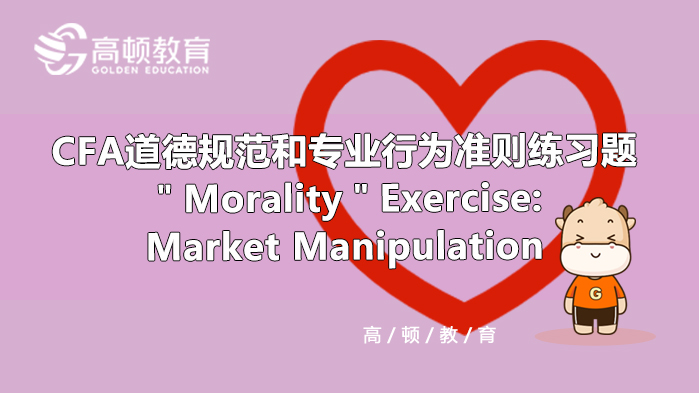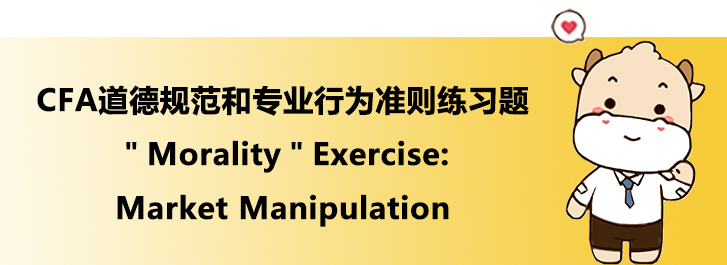CFA职业道德与专业行为标准(CFA Ethical and Professional Standards)向来是CFA一级和CFA二级考试的重点之一(CFA一级的比重达15%)。
在CFA考试中,涉及到职业道德与专业行为标准的考题往往最先出现。迅速并准确解答这部分考题,不仅有助于从考试开始就建立起信心,也能提高通过考试的机率。
CFA道德规范和专业行为准则练习题"Morality"exercise:Market Manipulation
Questions 1:
Lisa Hajak,CFA,specialized in research on real estate companies at Cornerstone Country Bank for the past twenty years.Hajak recently started her own investment research firm,Hajak Investment Advisory.One of her former clients at Cornerstone asks Hajak to update a research report she wrote on a real estate company when she was at Cornerstone.Hajak updates the report,which she had copied to her personal computer without the bank’s knowl�edge,and replaces references to the bank with her new firm,Hajak Investment Advisory.Hajak also incorporates the conclusions of a real estate study con�ducted by the Realtors Association that appeared in the Wall Street Journal.She references the Journal as her source in her report.She provides the revised report free of charge along with a cover letter for the bank’s client to become a client of her firm.Concerning the reissued research report,Hajak least likelyviolated the CFA Institute Standards of Professional Conduct because she:
A、solicited the bank’s client.
B、did not obtain consent to use the bank report.
C、did not cite the actual source of the real estate study.
【Answer to question 1】A
【analysis】
A is correct as soliciting the bank’s client did not violate Standard IV(A)–Loyalty because the manager is no longer an employee of the bank and there is no indication she obtained the client information from bank sources.The member,however,has violated Standard V(C)–Record Retention,because when she left the bank she took the prop�erty of the bank without express permission to do so.In addition,the analyst violated Standard I(C)–Misrepresentation by creating research materials without attribution,which is demonstrated when the manager adds to the new report a real estate study she saw in the Wall Street Journal,referencing the Journal only.In all instances,a member or candidate must cite the actual source of the information.If she does not obtain the report and review the information,the manager runs the risk of relying on second‐hand information that may misstate facts.Best practice would be either to obtain the com�plete study from its original author and cite only that author or to use the information provided by the intermediary and cite both sources.
B is incorrect because according to Standard V(C)–Record Retention,when a member or candidate leaves a firm to seek other employment,the member or candidate cannot take the property of the firm,including originals or copies of supporting records of the member’s or candidate’s work,to the new employer without the express consent of the previous employer.
C is incorrect because the analyst violated Standard I(C)–Misrepresentation by creating research materials without attribution,which is demonstrated when the manager adds to the new report a real estate study she saw in the Wall Street Journal,referencing the Journal only.In all instances,a member or candidate must cite the actual source of the information.If she does not obtain the report and review the information,the manager runs the risk of relying on second‐hand information that may misstate facts.Best practice would be to either obtain the complete study from its original author and cite only that author or to use the information provided by the intermediary and cite both sources.
Questions 2:
Lin Liang,CFA,is an investment manager and an auto industry expert.Last month,Liang sent securities regulators an anonymous letter outlining vari�ous accounting irregularities at Road Rubber Company.Shortly before he sent the letter to the regulators,Liang shorted Road stock for his clients.Once the regulators opened an investigation,which Liang learned about from his sources inside the company,Liang leaked this information to multiple sources in the media.When news of the investigation became public,the share price of Road immediately dropped 30%.Liang then covered the short positions and made$5 per share for his clients.Liang least likely violated which of the CFA Institute Standards of Professional Conduct?
A、Misconduct.
B、Market Manipulation.
C、Priority of Transactions.
【Answer to question 2】C
【analysis】
C is correct because the member has engaged in information-based manipulation of Road stock in violation of Standard II(B)–Market Manipulation and Standard I(D)–Misconduct.Members and candidates must refrain from“pumping up”(or down in this case)the price of an investment by issuing misleading positive(negative)information for their or their clients’benefit.The member has not violated Standard VI(B)–Priority of Transactions because this concerns client investment transactions having priority over member or candidate investment transactions and is not applicable here.
A is incorrect because Standard I(D)–Misconduct,has been violated.The member should not manipulate the market!The premature use of the information is secondary,while the market manipulation is primary.
B is incorrect because Standard II(B)–Market Manipulation,has been violated.The member should not manipulate the market!Premature use of the information is sec�ondary,while the market manipulation is primary.
以上就是【CFA道德规范和专业行为准则练习题"Morality"Exercise:Market Manipulation】的全部内容,如果你想学习更多CFA相关知识,欢迎大家前往
高顿教育官网CFA频道!在这里,你可以学习更多精品课程,练习更多重点试题,了解更多最新考试动态。
版权声明:本条内容自发布之日起,有效期为一个月。凡本网站注明“来源高顿教育”或“来源高顿网校”或“来源高顿”的所有作品,均为本网站合法拥有版权的作品,未经本网站授权,任何媒体、网站、个人不得转载、链接、转帖或以其他方式使用。
经本网站合法授权的,应在授权范围内使用,且使用时必须注明“来源高顿教育”或“来源高顿网校”或“来源高顿”,并不得对作品中出现的“高顿”字样进行删减、替换等。违反上述声明者,本网站将依法追究其法律责任。
本网站的部分资料转载自互联网,均尽力标明作者和出处。本网站转载的目的在于传递更多信息,并不意味着赞同其观点或证实其描述,本网站不对其真实性负责。
如您认为本网站刊载作品涉及版权等问题,请与本网站联系(邮箱fawu@gaodun.com,电话:021-31587497),本网站核实确认后会尽快予以处理。



 更多服务
更多服务












